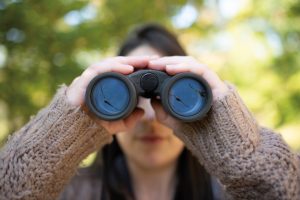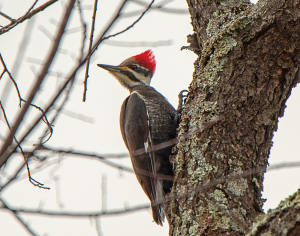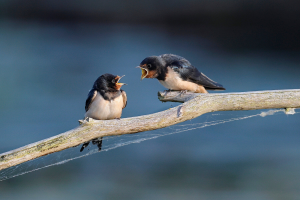Bird Brained
Birdwatching can improve mental well-being
 “I’ve had this recurring dream that I can fly,” says Mike Niven. “In my dreams, I run, take a leap and I’m flying. When I was a teenager, I got really into flying gliders. I guess it makes sense that I’ve become fascinated with birds.”
“I’ve had this recurring dream that I can fly,” says Mike Niven. “In my dreams, I run, take a leap and I’m flying. When I was a teenager, I got really into flying gliders. I guess it makes sense that I’ve become fascinated with birds.”
Mike is among the 45 million birdwatchers — also known as birders — in America, according to the U.S. Fish and Wildlife Service. Their interests range from casual observation at a backyard bird feeder to a passion that propels them around the globe in search of new species to add to their “life lists.”
It wasn’t until he retired a few years ago that Mike’s interest in birds deepened. A dedicated volunteer with nonprofit conservation organization Natural Lands, Mike makes time to birdwatch daily.
“I remember watching a barn swallow in my yard, and I started thinking about how incredible it is that that tiny bird can fly almost 7,000 miles from South America to my house in Pennsylvania. My interest grew from there.”
Scientists are taking a closer look at the benefits of birding for human health. Beyond the physical exercise that accompanies the hobby, research shows that birdwatching can change our brains and improve our mental well-being.
Avian Attitude

While numerous studies have shown the benefits of nature on mood, new research suggests there may be something particularly healthy about birds. Two studies published last year in Scientific Reports found that seeing or hearing bird songs improved mental well-being.
In one study, researchers asked participants to record information about their environment and well-being three times a day using a smartphone app. In analyzing their logs, researchers found a significant positive association between seeing or hearing birds and improved mental well-being, sometimes even hours after the bird encounter. The benefits weren’t explained by other environmental factors, like seeing trees, plants or water, all of which the study controlled for.
One of the study’s authors, Andrea Mechelli, said he was searching for answers to why city dwellers may be more prone to mental illness. “I don’t have a particular agenda focused on nature myself. I wasn’t thinking we were going to demonstrate nature has a strong effect,” Mechelli told National Geographic.
A second study found that listening to audio clips of birdsong reduced feelings of anxiety, depression and paranoia in healthy participants.

Another study, published in 2020 in Ecological Economics, showed a correlation between happiness and the number of bird species around people’s homes and towns. Researchers concluded that being near 14 additional bird species was as satisfying as earning an extra $150 per month.
Scientists have two main theories for why nature may soothe us. The first is that homo sapiens evolved in nature and so urban environments are jarring to our very beings. The second theory is called attention restoration theory. Like the first, it postulates that modern daily life requires intense focus. Nature allows us to disengage that focus and engage in a sort of open-eyed meditation.
Mike Niven can relate. “Birding allows me to be in the present moment,” he says. “When I’m outside with my binoculars or even just listening to birdsong while I’m weeding my garden, I’m immersed in it. Everything slows way down.”
This is Your Brain on Birds
Another study published last year suggests the effects of birding on the brain go beyond mood. A deep dive into birding may even boost cognitive ability.
Aptly named researcher Erik Wing and his colleagues asked birders of varying experience levels to identify images of both familiar and unfamiliar birds. All participants were shown bird images and asked to arrange them according to perceived similarity. Experts tended to group birds based on specific features, such as tail or beak shape. In contrast, the non-experts more often based their grouping on superficial features like color.

Next, the researchers tested participants’ memories. First, they showed each subject a series of bird photographs. They then showed them a second series, containing both novel and repeated bird species, and asked the participants whether they had already seen each bird in the first series of photographs. The researchers found that those who grouped birds based on specific features performed better in the memory task than those who grouped birds based on color.
Wing concluded that long-term knowledge of avian species helped people remember new birds more easily, and that gaining deep expertise in a subject area can change mental “scaffolding,” literally rewiring the brain.
Natural Lands volunteer Mike Niven likes the idea of birds helping his memory, mood and mind. He feels birds have enriched people’s lives — including their physical and mental health — so much, he only hopes humans can return the favor.
“As I’ve gotten more involved in birding and volunteering with Natural Lands, I find myself focusing on habitats. Without supportive habitats — meadows, forests, wetlands — we’re not going to have birds. So, we all have to do what we can to save and care for nature. After all, what will we do with our stress if the birds go away?”
Natural Lands is dedicated to preserving and nurturing nature’s wonders while creating opportunities for joy and discovery in the outdoors for everyone. As the Greater Philadelphia region’s oldest and largest land conservation organization, member-supported Natural Lands has preserved more than 125,000 acres, including 42 nature preserves and one public garden totaling more than 23,000 acres. Nearly 5 million people live within 5 miles of land under the organization’s protection. Land for life, nature for all. NatLands.org.
